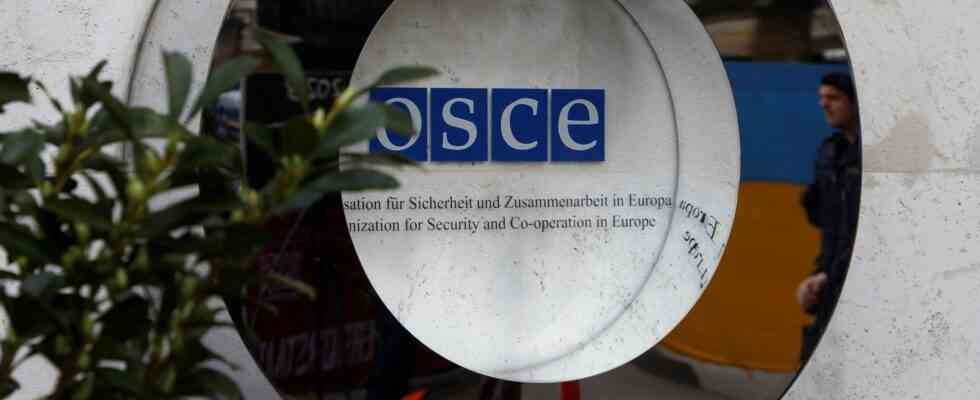Status: 02/23/2023 4:55 p.m
The fact that Russia is present at the OSCE meeting caused outrage beforehand. When Russian representatives spoke again of the “denazification” of Ukraine, MPs left the room.
Russia is isolated at this winter session of the Parliamentary Assembly of the OSCE, the Organization for Security and Co-operation in Europe. That couldn’t be clearer. Almost every request to speak on the first day of the meeting revolves around the unjustified war of aggression against Ukraine. Ukrainian flags hang in the meeting room, MPs wear blue and yellow ribbons on their lapels.
But there is also resentment. There is anger that the Russians were even invited. The Ukrainian delegation is staying away from the international parliamentary assembly, as is the one from Lithuania. Others vent their anger in the session.
MPs leave the room
And the Russians are realizing their fears: Vladimir Dschabarov speaks at a committee meeting of the “denazification” of Ukraine by Russia’s military operation. When most of the members of parliament demonstratively leave the hall while he is speaking, the Russian also insults them as Nazis.
Meanwhile, other MPs hold up Ukrainian flags, including members of the German delegation. Its head, Robin Wagener, makes it clear that he doesn’t expect Russia to be willing to engage in dialogue: “The Putin regime has no interest in a common security system and peace.”
Possibly the OSCE’s biggest crisis since it was founded
This presents the OSCE itself with what is probably the greatest crisis in its history. If all sides are not willing to engage in dialogue, there is not much to talk about. The President of the Parliamentary Assembly, Margareta Cederfelt, justifies the fact that the Russian delegation was nevertheless invited to Vienna with the words: “You deserve to listen when parliamentarians from every country tell you that you support Ukraine.”
Who a country sends is the decision of the national parliaments. Austria, as the country where the OSCE is based, is obliged to enable them to enter the country. This is how the Austrian foreign ministry reacted to demands not to issue visas to Russian Duma deputies. More than 80 MPs from 20 countries had demanded this from Austria.
Schallenberg: Visas for Russians are strictly limited
According to Foreign Minister Alexander Schallenberg, however, the visas were strictly limited: the Russian delegation had signed declarations that the visas would only be used for the purpose of visiting the Parliamentary Assembly.
Austria felt compelled to do so because an evening ball of right-wing fraternities from Austria, the so-called Akademikerball, is taking place on Friday in the same premises as the OSCE Assembly.
It is officially organized by the Vienna FPÖ. The party is close to Vladimir Putin’s United Russia party. If the Russian MPs attend the ball, said Schallenberg, he reserves the right to take consequences – such as not issuing visas in the future.
Stricter rules for MEPs in the future?
The Parliamentary Assembly is also debating whether to introduce stricter rules for MPs in the OSCE as well. Ukraine demands MPs can be suspended if their country wages war against another.
The OSCE is not superfluous, says the head of the Ukrainian delegation, Mykyta Poturayev: “We believe that the OSCE can have a future and be very effective. But we have a lot of work ahead of us.”
The Ukrainian delegation is now campaigning for this outside of the Parliamentary Assembly. These days she has had dozens of meetings with MPs from other countries.
OSCE: Dispute over Russia’s participation in Parliamentary Assembly
Silke Hahne, ARD Vienna, February 23, 2023 4:55 p.m

